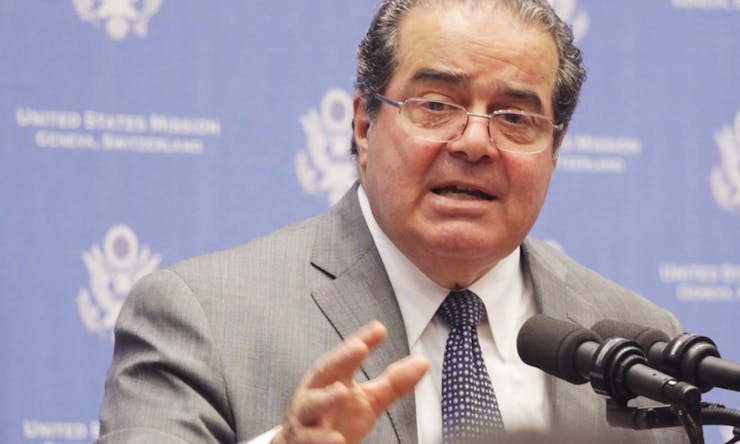The death of U.S. Supreme Court Justice Antonin Scalia could have major repercussions for an important test of cannabis legalization before the high court early next week. The remaining eight justices are expected to consider whether to hear Nebraska and Oklahoma v. Colorado, a lawsuit that challenges legalization in Colorado, as early as Monday. (The conference had been scheduled for today, February 19, but was postponed due to a ceremony honoring the late justice.) If the case moves forward, it could derail Colorado’s regulatory apparatus and have a chilling effect on the nationwide legalization movement.
The attorneys general of Nebraska and Oklahoma filed suit in December 2014, claiming that the legalize-and-regulate program established in 2012 by Colorado’s Amendment 64 harmed their states by facilitating cannabis exportation across state lines. If at least four justices vote to accept the case, the Supreme Court will hear it in full later this year.
Joel Warner, writing recently in the International Business Times, put the justice’s absence in stark terms. “Scalia’s missing vote could change the fate of a case that has the potential to dismantle the country’s nascent legalized market,” he wrote.
Scalia could have provided a fourth vote — or not. On the bench he often sided with states’-rights advocates, but he was an ardent foe of any kind of cannabis legalization or leniency. In a recent analysis of Scalia’s record, writer Tom Angell concluded that “he probably wasn’t a fan of the fact that local businesses in Colorado are selling marijuana in defiance of federal law.” Scalia’s stand in favor of states’ rights and against federal overreach seemed to reach its limit when it came to marijuana. In the 2005 case Gonzalez v. Raich, he joined the majority in upholding the federal government’s right to prosecute a woman who grew medical marijuana in accordance with state law.
Today’s case was perhaps best summarized by a Denver Post reader named Corey Whitmer, who posted this comment to a story in late 2014: “Ah, the Upset Neighbors. Calling the cops about the house party next door.”
As the British might say: Spot on.
Nebraska and Oklahoma, in their original complaint, argue that Amendment 64 “has created a dangerous gap in the federal drug control system enacted by the United States Congress. Marijuana flows from this gap into neighboring states, undermining Plaintiff States’ own marijuana bans, draining their treasuries, and placing stress on their criminal justice systems.”
As many observers have noted, it’s a curious argument that, if accepted, could lead to an untold number of lawsuits between the states. Utah could sue California over its more permissive alcohol laws. California could sue Utah over its more permissive laws on guns. Texas could sue New Mexico over differing abortion laws. Washington could sue Oregon over the disparity in retail sales tax. (Washington has one, Oregon doesn’t, and Washington car dealerships near the border suffer the harm.)
The legal brief filed by the attorneys general of Oklahoma and Nebraska does make one thing clear: They are hoppin’ mad at Colorado. “If this entity [Colorado] were based south of our border,” they wrote, “the federal government would prosecute it as a drug cartel.”
The Obama Administration has weighed in on Colorado’s side. Solicitor General Donald Verrilli argued that Nebraska and Oklahoma haven’t been injured by Colorado. “At most, they have alleged that third-party lawbreakers are inflicting those injuries, and that Colorado’s legal regime makes it easier for them to do so.”
That did not please the AGs of Oklahoma and Nebraska, who retorted that the administration sought to “blame the whole problem on Joe Blunt.”
Yes. Joe Blunt.
“Colorado has created a massive criminal enterprise,” the upset AGs added. “Colorado created this illicit market for profit, and profit handsomely it does thanks to taxes imposed at every step.”
Colorado, for its part, noted that its neighbors weren’t challenging Colorado’s right to legalize – only its right to regulate. “In other words, if [Nebraska and Oklahoma’s] requested relief is granted, recreational marijuana would remain legal, but Colorado would lose the ability to monitor and regulate its retail supply and distribution.”
The case may ultimately turn on the fundamental question of jurisdiction. State-against-state lawsuits go directly to the Supreme Court, but the court accepts them only under rare circumstances. A 1992 case, Mississippi v. Louisiana, set a high bar: Before the Supreme Court could move to control the conduct of one state at the behest of another, the opinion says, “the threatened invasion of rights must be of serious magnitude and it must be established by clear and convincing evidence.”
Under those provisions, the harm delivered by Joe Blunt driving east from Denver might not be worthy of the high court’s consideration.
Image Source (curves, cropped): United States Mission Geneva via Wikimedia Commons






